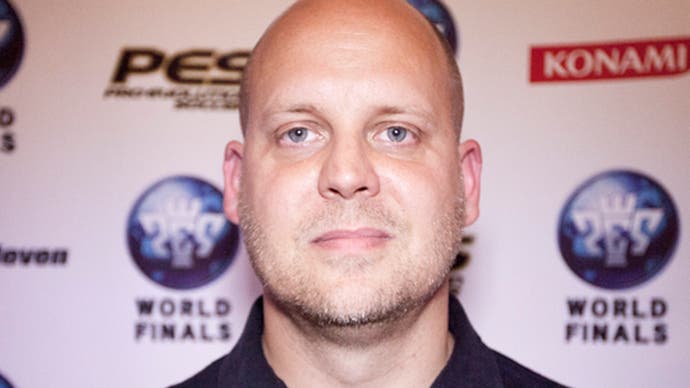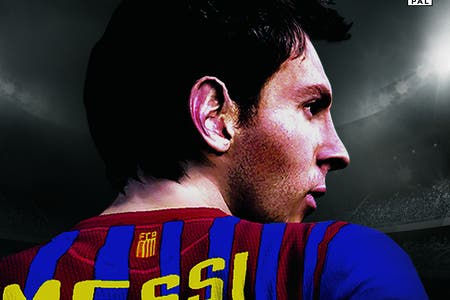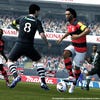PES hits back: Konami accuses FIFA of copying, reveals truth behind licenses and explains Seabass' new role
"The only reason why FIFA is in the position it's in now is because of PES."

Jon Murphy has had enough. I can see it in his face as we sit down for our interview in Konami UK's Chiswick offices. And I can feel it in every answer he delivers to all the questions I put to him.
Perhaps it's not surprising. The Konami veteran has spent years as Pro Evolution Soccer European team leader banging the PES drum, but the last few have, by his own admission, been the most galling. As EA's FIFA series has pulled away from PES - the game so many of us played religiously "back in the day" before turning to the dark side at the beginning of this generation - he's had to accept second place. A distant second place. And doesn't everyone know it.
Still, the frankness with which he discusses PES' problems surprises me. During our chat Murphy explains Shingo 'Seabass' Takatsuka's shock exit from the console PES team, accuses FIFA of copying, alleges EA locks out Konami from licenses and delivers some home truths to fans of the football video game genre who, he believes, need their heads banging together.
Fair play, I say. For too long the enigmatic Japanese company has shied away from tackling the problems its once all-conquering football franchise has suffered from in recent times. As PES 2013 - a game that may match FIFA in terms of quality - nears release, the next-generation looms and series overlord Seabass is finally off doing something else, perhaps some aggression is just what we need.
I've heard good things about the game this year (see Martin's PES 2013 preview), and now I've played it I can see why. But I know what our readers will say: I've heard that before, why should I believe PES is better now? You must see this reaction. How does that impact on the work you do?
Jon Murphy: It does have a lot of impact particularly on what I do, because my job is to try and get the team to have a deeper connection with fans and obviously that's not always easy because they're over in Japan and a lot of them don't speak English. So there's a lot of filtering that has to be done on that process.
I understand where the fans are coming from, because in past years we have talked about going down a certain direction and I don't think we've gone far enough down that direction. I don't think it's necessarily that we've not done what we've said. It's that we haven't taken it far enough in the past. The reason this game feel like it plays differently is because the things we've concentrated on we are pushing to the logical conclusion rather than holding back.
The reason for that is to do with the setup of the team now. The organisation within the team has changed. We've got new producers coming through. We've got a new guy called Kei [Masuda]. It's not just him - there are other key people in other positions. The team structures have changed and the way they work together has changed.
At the moment we're seeing finally trust in our plans, and full conviction with what we want to see through. In the past, a good example is the manual passing system we brought about several years ago, but we never took it to the stage where it was really completely hands off. This new team is now willing to take those risks.
What sparked this structural reorganisation?
Jon Murphy: I wouldn't say sparked is the right way of describing it because it's been so gradual. It's been the struggle we've had on this generation. It's been the releasing of a couple of products, realising where we were going wasn't where the team wanted to be going, but at the same time certain people within the team had been there for a long time perhaps, didn't really know how to force it in a new direction.
At the same time there have been changes in upper management as well. There have been company changes that have been made where, as a Japanese company we see dealing directly with the consumer as key to the development of products. There have been all kinds of forces at work.
From my side, I've been trying to open a door for consumers for some time. That's been a gradual process as well. All these things have come together this year to the point where we feel like we're back on a route we're happy with. If you talk to the team it's a route we will then continue into the future. The product this year, there are key focuses within that product they intent to push out into future years with future versions using different engines.
For the first time Seabass is no longer the face of PES. Why is that?
Jon Murphy: Because we wanted to have a certain amount of shake-up in the team to get new blood through, and also because we've got him on new projects that aren't directly related to the PES franchise as you would see it as the traditional model. Obviously there's a lot of time and space left for a video game of the like of PES as you would understand it, but we can't sit around thinking just as video games now. Someone's got to be thinking about new projects. So he's filling that role. At the same time it gives us a chance to blood some new kids and force some new directions.
Was the decision to remove Seabass from PES made in part because of a degree of dissatisfaction with previous PES games that perhaps didn't go far enough?
Seabass himself had got to a point where he was perhaps getting a bit frustrated as to how he would take the franchise on.
Jon Murphy: You have to think these things play a part in the decisions we've made. It's not just things like that. Seabass himself had got to a point where he was perhaps getting a bit frustrated as to how he would take the franchise on. He was right there at the start of development of PES. He was the creator of PES so to speak. His vision of football games hadn't developed as fast as the machines that could run football games. He had a more traditional view of video games rather than a modern view of video games, which is to do with the sandboxing of games and the rewards that can be offered by that.
We've seen in Japan, it's fair to say, for a long time a tradition of storytelling with a video game. Whereas in America or Europe we've seen a more freestyle approach - at least it gives the impression of freestyle. Obviously a sandbox game isn't a sandbox game - you're still being led by the hand, but that impression was different between the two cultures.
There are lots of reasons for him stepping over. He's not stepping down from the team. Day to day he's still involved in everything they're doing. He's within the production team for all PES-related items. He's still in the same office. He's still sat alongside the same people. He's still walking around giving input. It's not that we've booted him out of Konami. He's been moved on to what could turn into potentially some very interesting ideas on where to take football.
So he is still working on PES the brand?
Jon Murphy: He is still working on football for us, is probably the easiest way of thinking about it. Whether or not that's Winning Eleven or PES production stuff, or we've got a whole new IP, or a new system of delivering games, whatever it is, he's involved in our football studio still. As far as the short term goes that is PES anyway. So he's still there with PES. What that turns into later goodness only knows. But he's still there.
How do you access PES' current health in the UK specifically but also in the wider context of Europe? How's it doing?
It's probably gone through a period of intensive care and is now showing full signs of recovery. It's had a massive shot of morphine in its arm, and it's just about to get out of bed and start fighting again.
Jon Murphy: It's probably gone through a period of intensive care and is now showing full signs of recovery. It's had a massive shot of morphine in its arm, and it's just about to get out of bed and start fighting again.
In the UK it feels like last year FIFA pulled away from PES, more so than in previous years.
Jon Murphy: You can talk about two things: the quality of the product and the sales of the product. In terms of the sales of the product, clearly EA has been pulling right away from us. To be fair, if you look directly at the UK, we've never had a lead on them. We've always had a product quality lead on them, but we've never overtaken them in sales. There's always been a sales gap. The sales gap has grown in the UK. That's obvious. It's partly due to the quality of the product, which we've been improving and now stacks up easily against FIFA with this version. But it's also to do with the money spent on marketing and the money spent to lock us out of licenses.
There's a certain amount of work they've done very well on PR to convince people that the gap is bigger than it actually is.
What do you mean by that?
Jon Murphy: Opinion has turned against PES in a way that's been helped along that isn't necessarily born out by the quality of the product recently. There was a period of dissatisfaction with the product with good reason - several years - where we didn't know where we were going. But recently the quality of the product has come back, and I don't think we've been given proper respect for that because so many have bought into the idea that FIFA is better, just in the same way people bought into the idea PES was much better than FIFA in years gone by, and it took a while for them to get out of that situation because it was so ingrained. We're now seeing the opposite's true. There's an automatic assumption now that FIFA is just better.
For example, if you look at satisfaction with online experience, we get a lot of complaints from people saying they're not happy with the lag in PES, and that FIFA has perfect online play. We all know if you play FIFA online you have a whole series of problems. I'm not saying we're better online or they're better online, but the opinion swung around to put us under the microscope more than them these days. I also think we don't get enough recognition for the way we tend to innovate still and they do still tend to follow a lot of what we do.
Can you give me any examples of that?
Jon Murphy: If you look further back into the past of PES you can see they've obviously gone from a game that was totally different from PES to one that started copying PES to one that started taking areas PES did well further into the product they have now.
There's been a whole series of - and I'm sure they won't disagree with this - taking PES apart and rebuilding theirs in direct comparison. And you see other things, such as the replication of players, which we're now bouncing back at with our Player ID. And there are other recent examples as well where it seems as soon as we're announcing one thing they're announcing the same thing as well. I'm not sure how that happens by accident so often.
What are you saying there? Are you accusing EA of copying PES?
Jon Murphy: Yes.
I wouldn't say they are actively doing that right now. I'm saying they have a long history of copying PES to get to where they want to be. People shouldn't forget that's how they got where they are. You can give them loads of credit for how they've got to where they got to now, and you can see it as a totally valuable product in its own right that does have ideas we can all learn from, but we shouldn't forget that PES innovated all of this stuff and they did copy it.
Is development set up in a way that EA can react so quickly to your announced features to have them in FIFA? Or is it just a coincidence?
This year they're talking about the AI and gameplay as being a key force, which is exactly what we were dealing with last year as a key feature. That's not a coincidence, I'm sure.
Jon Murphy: I have no idea. In many cases it must be coincidental. But then you do see them reacting to what we've done last year quite naturally. For example, this year they're talking about the AI and gameplay as being a key force, which is exactly what we were dealing with last year as a key feature. That's not a coincidence, I'm sure.
I'm not going to start knocking the fact they've pushed the football genre onwards, while we were stagnating, and they've invested properly in this generation of consoles. That's really kicked them on. But it's just a bit galling at times that people throw FIFA in your face constantly, and you're thinking, well hold on, the only reason why FIFA is in the position it's in now is because of PES. And it doesn't mean to say FIFA will always occupy that position.
You say EA has locked you out of official licenses. I know many people who play FIFA because of the official licenses. Is it something you will ever be able to do something about, or is that the way it's got to be forever?
Jon Murphy: I hope not. You would hope that with certain licenses the people who have them would see the advantage of pushing it out to the widest audience rather than keeping it exclusive to one product.
You must be trying to convince them to do that. Why don't they?
Jon Murphy: Because at the end of the day, without going into too much detail, there are obviously a lot of existing contacts between EA and who they deal with and a lot of trust between them, and there's a lot of money changing hands, and trying to break into those situations is very hard. At the same time it should be pretty obvious that we can't compete with the massive budgets they have to throw at these things.
So, for example, with the Premier League, we've opened up negotiations with them in the past and we've got quite close to what we thought was a good offer. It went to EA exclusively. And then after that EA have been dealing directly with the clubs themselves to lock us out of individual club deals as well. So there are several layers we have to be trying to fight through.
I get a bit fed up with this lack of understanding about why we don't get licenses. It's not because we're lazy.
It's something that Konami hasn't been willing to talk about in the past. I'm not sure Konami is particularly willing to talk about it right now to be honest. But I get a bit fed up with this lack of understanding about why we don't get licenses. It's not because we're lazy. It's not because we don't try and get the right licenses. It's not that we don't raise budgets to do so. Unfortunately, the reality is, EA is a massive company with large chests of money that can be brought from all kinds of IP, beyond even their FIFA brand, and we can't fight against that. So we've got to just try and be clever with what we can get out of licenses.
But people need to understand that these are the reasons at play. There just needs to be a bit more understanding when someone says to us, you're just rubbish with licenses. It's not as simple as that.



















